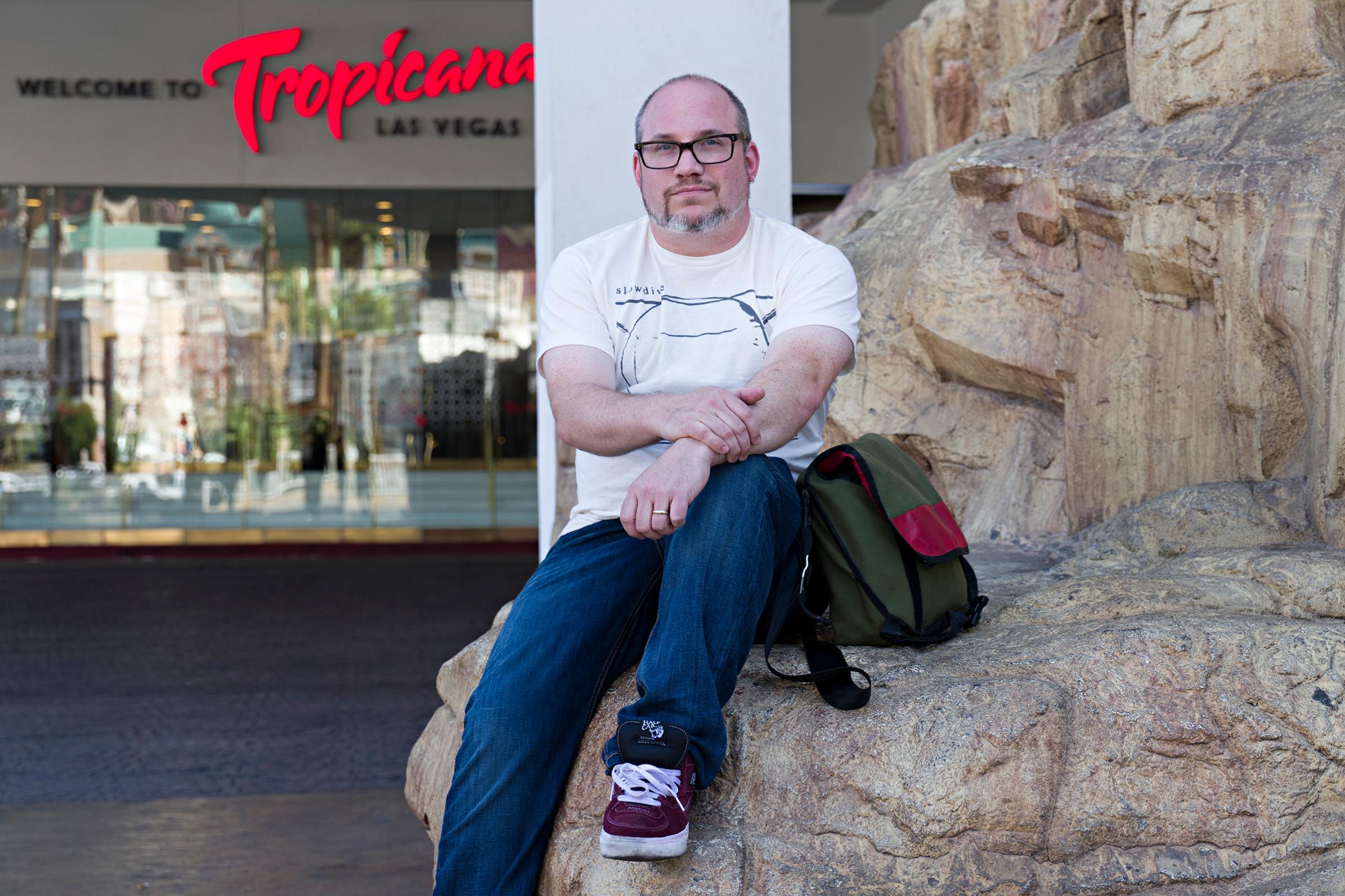Sunday was just not Aaron Banner-Goodspeed’s day. The TSA confiscated his shaving cream; he thought he might be able to sneak it through airport security, but he got busted. So when the 43-year old data analyst for a Boston hospital landed in Las Vegas after a five-hour flight, he had to schlep out to buy more. Then he ate some dinner and went back to his room and tried to find an episode of Curb Your Enthusiasm on TV. But the Tropicana hotel had no HBO. Just his luck.
He was hanging out in his underwear, flipping through basic cable channels, when he heard a commotion outside his room on the first floor. “I thought ‘oh it’s Vegas on a Sunday night, it’s a little louder than I remember,'” Banner-Goodspeed said. He thought there was a party, or maybe a fight. Then he heard a knock on the door.
He put on a pair of jeans. He went to the door and opened it. A guy in his 20s said “there’s a shooter,” then ran down the orange-carpeted hallway. “Then a crowd of people came in running, and I was behind the door,” he recalled. “The next thing I knew there were 18 people in my room.”

They were all concert-goers who had fled the Route 91 Harvest Festival when gunman Stephen Paddock opened fire from the nearby Mandalay Bay Resort and Casino, killing at least 58 people and wounding more than 500 others before taking his own life, in the deadliest mass shooting in modern U.S. history.
Like thousands of other survivors, they had sprinted to the nearest shelter they could find, which for them was the Tropicana hotel. They didn’t know that the gunman was working alone, that he was holed up on the 32nd floor of the Mandalay Bay and had likely already shot himself. There could be other shooters, they thought. This could be a coordinated terrorist attack, like in Paris, they thought.
Read more: They Survived the Las Vegas Shooting. But They Don’t Want More Gun Control
The unexpected visitors turned off the TV, drew the blinds and sat in total silence. “They didn’t know where the bullets were coming from,” he recalls. “A lot of them had the reaction that they thought they were being hunted down.” Banner-Goodspeed tried to help as best he could. He passed around waters and told them his room number so they could tell their loved ones they were safe. When one survivor’s mother kept calling the room phone, a minor panic rippled through the packed hotel room. “People were genuinely scared that there was a terrorist at the front desk calling up room lines to find people and hunt us down,” he said. “It was really a bunch of people in full paranoia and shock.”
They didn’t move or talk. They didn’t exchange names for fear or making noise. The strangers sat in silence, frozen in terror. “Whenever anyone heard a noise, everyone was like ‘shut up,'” he recalled. After about five or six hours of frozen silence, they began to hear reports that it was safe to emerge.
Outside Banner-Goodspeed’s room, the Tropicana was filled with survivors trying to make sense of the massacre. Kelsey Clark, a 25-year old police officer from Olympia, Wash., fled the bullets while eight months pregnant and sought shelter in the Tropicana. When she got there, she met a young girl who had a gunshot wound in her elbow and had watched her mother get shot in the chest. “Her training kicked in,” recalled Clark’s husband Toby, 27. “Kelsey was comforting her, trying to calm her down and tell her she’s gonna be alright, and she’s gonna make it through this.”
The scene in the casino was so chaotic that some survivors feared the shooter had followed them inside. “It sounded like there was shooting inside the casino,” recalled Kelsey Clark’s mother Kelly Moore, 54. She hid first in an office, then in a big refrigerator, but neither room had doors that would lock. She grabbed two baking pans that she planned to use as a shield in case the shooter found her. “There were a lot of places the gunfire could be coming from. We didn’t know if we were running into it or running away from it,” she said. “There were so many unknowns.”
Banner-Goodspeed said opening his door to terrified strangers was the least he could have done in that situation. “I couldn’t imagine shutting the door on people like that, I couldn’t imagine how anyone could have,” he said. But even though he didn’t hear a single gunshot or see a speck of blood, he’s rattled. He had seen tragedy before, but it had never literally knocked on his door.
“I was in Israel when bombs went off. I was in Boston when the Marathon bomb went off,” he said. “It feels like it’s getting closer and closer.”
More Must-Reads from TIME
- Donald Trump Is TIME's 2024 Person of the Year
- Why We Chose Trump as Person of the Year
- Is Intermittent Fasting Good or Bad for You?
- The 100 Must-Read Books of 2024
- The 20 Best Christmas TV Episodes
- Column: If Optimism Feels Ridiculous Now, Try Hope
- The Future of Climate Action Is Trade Policy
- Merle Bombardieri Is Helping People Make the Baby Decision
Write to Charlotte Alter at charlotte.alter@time.com